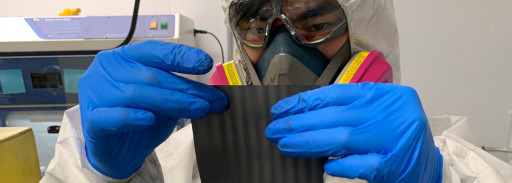
Activated Dry Solid-state Battery Electrode
LiCAP's engineer holds a sample of a stand-alone film of Activated Dry Electrode developed for SSB.
SACRAMENTO, Calif. - March 11, 2022 - (Newswire.com)
LiCAP Technologies, Inc. expanded a portfolio of technologies compatible with the proprietary Activated Dry ElectrodeTM process, unveiling a cost-effective and sustainable pathway for commercialization of the solid-state battery.
Solid-state battery (SSB) technology holds the promise of improved safety, increased specific energy, and energy density over conventional lithium-ion batteries (LIB). However, the traditional "wet" coating approaches to electrode manufacturing used in the commercial production of LIBs are not compatible with the dry room processing of moisture-sensitive solid-state electrolyte materials.
LiCAP successfully applied the Activated Dry ElectrodeTM technology to the manufacturing of solid-state battery electrodes and produced the first catholyte samples. Since the start of the trials in February 2022, LiCAP developed several SSB electrode formulations with NMC and sulfide-based electrolyte materials. These materials were processed into stand-alone active layer films and laminated on aluminum current collectors. At the current development stage, LiCAP can manufacture SSB electrode samples with the areal mass loading ranging between 26-60 mg/cm2 with high electronic conductivity. Moreover, LiCAP's engineering team determined that the developed SSB electrodes can be scaled-up to a pilot and large-scale production similar to the already existing lines for lithium-ion battery and ultracapacitor electrodes.
"The wet coating process is proven in the lithium-ion battery industry, but its compatibility with SSB is limited and the economics are flawed," said Dr. Linda Zhong, the president of LiCAP. "Activated Dry ElectrodeTM technology can address the shortcomings of traditional slurry coating. We are working on a breakthrough solution, which would open the automotive industry up to the next generation battery. Our pre-production line will produce SSB electrodes at a 60 m/min speed and will be commissioned in 2023."
"Our Activated Dry ElectrodeTM process will help the solid-state battery industry to achieve performance, low-cost targets and, ultimately, pave the path to commercialization," said Dr. Katharina Gerber, Director of Business Development for LiCAP. "Our pilot equipment is now available for feasibility projects on customer's SSB materials at our facility located in Sacramento, CA."
ABOUT LICAP TECHNOLOGIES, INC
LiCAP Technologies, Inc. is a leading developer of sustainable manufacturing solutions for electrodes used in lithium-ion batteries (LIBs), lithium-ion capacitors (LICs), ultracapacitors (UCs), and, most recently, in solid-state batteries. The core technology, Activated Dry ElectrodeTM process, is applicable to the manufacturing of low-cost premium electrodes for a variety of secondary energy storage applications. Co-founded and led by the original inventor of the "dry electrode" technology, LiCAP is headquartered in Sacramento, California and employs more than 150 people worldwide. LiCAP's ultracapacitor cells and modules are commercialized for a number of power applications. LiCAP's battery electrodes are currently undergoing customer testing with the world's largest battery and automotive OEMs. For more information, please visit www.licaptech.com.
Related Files
Public Press Release_SSB_March 2002.pdf
Press Release Service by Newswire.com
Original Source: LiCAP Technologies, Inc. Introduces the Activated Dry Electrode for Solid State Battery
